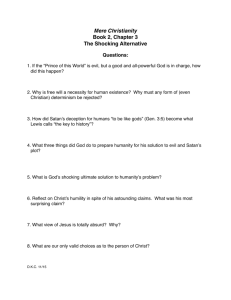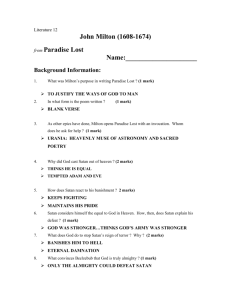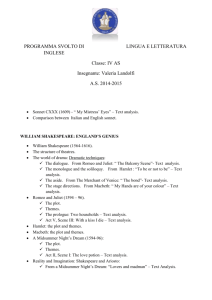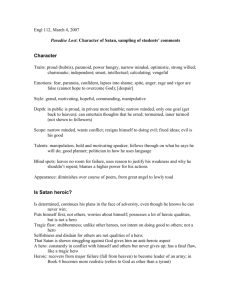"I Won't Betray You": Milton, Nietzsche, Berry
advertisement
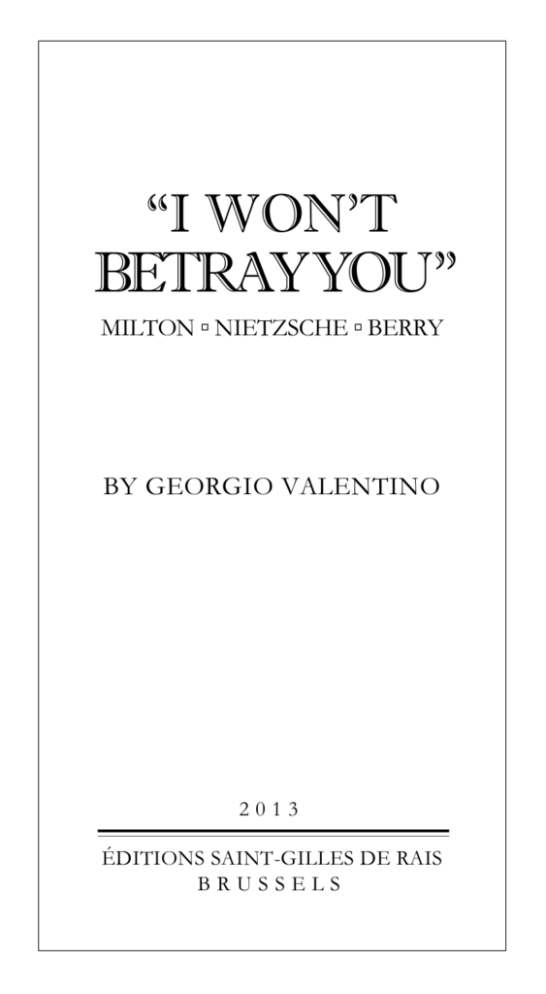
“I WON’T BETRAYYOU” MILTON ▫ NIETZSCHE ▫ BERRY BY GEORGIO VALENTINO 2013 ÉDITIONS SAINT-GILLES DE RAIS BRUSSELS “I Won’t Betray You” (G. Valentino) I’ve remained in suspense. I’ve learned all my lessons well. I don’t need anybody’s condescending help. I’ll never forget What Chuck Berry said As he leant in regret to stroke that poor girl’s piss-soaked hair and said: ‘I won’t betray you.’ If there is a god In Nietzschean thought, It would be this proud, black Lucifer bent, gentle and vengeful in turn, who says, ‘I won’t betray you.’ W ho hasn’t read Blake’s seminal note in his Marriage of Heaven and Hell? A single sentence might be considered the very manifesto of Romanticism: ‘The reason Milton wrote in fetters when he wrote of Angels and God, and at liberty when of Devils and Hell, is because he was a true poet, and of the Devil's party without knowing it.’ Unwittingly, no doubt, Milton did make of Satan the hero of Paradise Lost and in so doing produced a new, revolutionary figure in letters. Blake styles the poem a history of desire’s repression by a sovereign reason , which yields in his Marriage the rather basic eponymous schematic: Heaven above and Hell below. This is in fact the ‘divided empire’ (IV.110) which the exiled Satan declares in lieu of an impossible re-conciliation. His declaration delimits a sovereign territorial space from which Satan will challenge the rival sovereignty of God and of which, ultimately, ‘more than half perhaps, [he] will reign; as man ere long, and this new world, shall know’ (IV.112-13). If the two fiefdoms are indeed reconciled in the Marriage, it is not strictly speaking, through ‘marriage’ but rather through a reverse repression of reason by desire, under the sign of the latter’s ‘infernal wisdom’. The Marriage of Heaven and Hell, or Satan Triumphant. This is the Romantic Satan, at once Prometheus and Napoleon. Martyr, hero and martyr again. This figure was revolutionary in its programmatic opposition to God (‘Evil ’ versus ‘Good’ in Milton, ‘Geni us’ versus ‘R eason ’ in Bl ake) . It cl eared a subjecti ve space, established a subject position from which the Romantic could address the problem of desire in a molar movement which was not without its merits, although it would pose molecular problems of its own. This figure has been criticized for its flamboyant pathos—an empty criticism in itself—and, more significantly, for establishing the structural conditions which permit, even provoke, the Romantic articulation of said pathos, namely the cult of the Self. There is also, however, a post-Romantic Satan to be read in Paradise Lost. What is revolutionary about this other Satan is not that he desires. A chimp can desire. In any case, desire is not necessarily revolutionary. It nurtures the same totalizing impulse as reason. Reason desires. Desire has its reason. Desire desires reason. The post-Romantic Satan is revolutionary not in his conviction to liberate desire but in his inconstancy toward it. His bouts of glorious angst and indecision are also functions of the liberty which Blake observed in Milton’s handling of Satan. It is in these passages that he destabilizes the very notion of subjectivity, of a subject who desires and can only either enslave or liberate his desire. Satan’s revolutionary moment is without question brief but it endures; it is his desperate becoming-Evil (‘Evil be thou my good!’ [IV.110-13]), which is at its root a deterritorialization in the Deleuzo-Guattarian sense. In the instant before he reterritorializes back on desire (which is only then legible as Romantic)—and during those moments of doubt which pepper Paradise Lost, when he ‘like a devilish engine back recoils upon himself’ (IV.15-16), when he verges even on penitence—Satan is nearly consumed, in his capacity as ethical subject, by a pure intensity. One might argue that this is, historically speaking, rather a preRomantic Satan. But, in truth, he i s onl y l egi bl e as such after the reterritorialization undertaken by Romanticism and, later, the deterritorialization of Romanticism itself undertaken by Nietzsche, who might have sang with Milton’s Satan: ‘Only in destroying I find ease to my relentless thoughts’ (IX.129-30). Philosophizing with a hammer, Nietzsche made of destruction the modern value par excellence and so, like Blake, necessarily reterritorialized on ‘Evil’, albeit after a fruitful detour through paganism. But then he deterritorialized again. And again. And again. ‘That I have to be struggle, and becoming, and purpose, and cross-purpose—ah, he who divineth my will, divineth well also on what crooked paths hath it to tread! Whatever I create, and however much I love it,—soon must I be adverse to it, and to my love [...] Verily, my Will to Power walketh even on the feet of thy Will to Truth!’ This is the destruction which produces not simply another sovereign regime but produces ad infinitum. ‘I am that which must ever surpass itself’ (Zarathustra, II.34). The Nietzschean œuvre did indeed surpass itself, becoming increasingly decentred—but not abstracted— in its trajectory from the dialectics of the Birth of Tragedy and the Genealogy of Morals to the schizophrenic free verse of Thus Spoke Zarathustra to the Wahnbriefe and the syphilitic Nietzsche’s ephemeral, unrecorded ramblings in hospice. The conditions of our post-Romantic Satan’s legibility in Paradise Lost are possible only after Nietzsche. This figure is nonetheless very real but we don’t call him Satan; we call him Chuck Berry. For there is no work in the twentieth century which communicates with Milton’s masterpiece on the level of the pure, blinding intensity of their becomings-Evil more than Berry’s infamous sex tape. Anecdotal traces of Berry’s eccentricities and outright transgressions are, of course, integral to his biography. But here they are, fully realized, no longer obscured by the fig leaf of forensic jargon as found in published sources (i.e., the ubiquitous ‘Mann Act’). On this tape one finds nothing of the Dionysian bacchanalia that characterises, for example, Bob Crane’s endless reels of orgy footage. These only suggest their author’s compulsion in the context of their obsessive totality, never within the frame. Berry’s compulsions are on the screen for all to see. Yet it is neither pathology nor transgression that connects this curious work with Paradise Lost and the Nietzschean œuvre to produce a new Satanic machine. It is rather Berry’s own Miltonian moment, which forms the (anti)climax of the performance. This comes not when Berry instructs his partner to mechanically repeat such phrases as, ‘I came miles and miles just to sit on this dick’; nor when he interrupts coitus in a flash to leap up and squat over the anonymous woman’s breast, clearly intent on defecating; nor when, after she heaves him off reflexively, he leads her sulkily out of the bedroom with the dry announcement, ‘it’s time for breakfast.’ Nor does it arrive when the pair install themselves in the bathtub and he, standing, begins to urinate while pronouncing the obvious: ‘I’m pissing all over you, that’s what I’m doing’; nor even when he explodes in flatulence and barks, ‘now you can smell my fart.’ Nor does this Miltonian moment arrive when Berry asks, ‘how does that piss taste?’ and, not content with the answer—what else but ‘bitter’?—, adds with child-like satisfaction, ‘tastes great, doesn’t it? It’s salty.’ Nor, later, when he taunts, ‘I could kiss you... but you smell like piss,’ then snarls in disgust, ‘clean yourself off. Take a shower.’ No, Berry’s satanic moment arrives when he kneels down, rag in hand, to clean and comfort his counterpart. ‘I’m sorry. Did I piss in your eyes? On your neck?’ The performance is patently insincere at first. Indeed, Berry is practically chuckling to himself. But after a pause he waxes gentle and says solemnly, ‘I won’t betray you.’ Another pause, then again, more emphatically, ‘I WON’T BETRAY YOU.’ This astonishing formula, repeated as if an incantation or a cipher, dissolves Chuck Berry. ‘That space the evil one abstracted stood from his own evil, and for the time remain'd stupidly good, of enmity disarm'd, of guile, of hate, of envy, of revenge’ (PL, IX.463-66). This is not a return to the ‘Good’ even though it is indeed a partial, bizarre reterritorialization on loyalty and contrition. It is better understood as a movement, a ligne de fuite, necessarily ‘beyond good and evil’ and, at the same time, a subterranean knot around which the new Satanic machine elaborates itself. Presented in the context of the live performance situation At Home with the Ludskis (n° 8) staged in London on the 27 th of April, 2013 with Georgio ‘the Dove’ Valentino: voice, guit ar, at mospherics Patrizia F: bass guitar, and Benj amin Meunier: drums. This literature carries the only plan of salvation. Do not throw it away. P ass it on to another.

